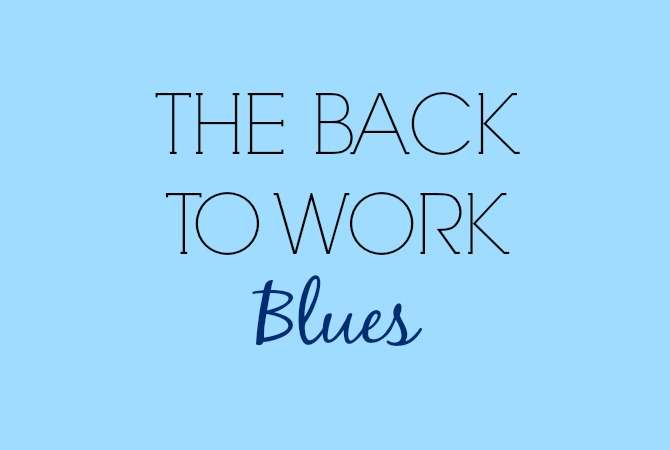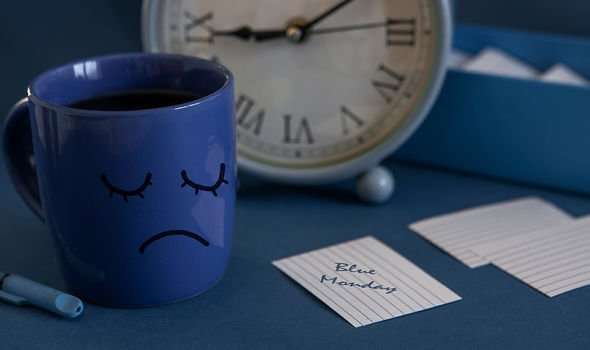How to beat the Monday Blues?

Not just Monday, working days are always blue. I am sure NUWers you will understand the feeling of dread going to work after the holidays. How you wish to stay in a cozy bed during the winter, go out under the sun during the nice summer. Don’t worry, you are not alone. Lets learn how to beat the Monday Blues!
In recent years, WHO have classified occupational burnouts as an international disease.
Occupational burn-out is when you feel exhausted from work, increased mental distance from the job, feel negative with work and when your efficiency level starts decreasing, but at the same time become a workaholic where you skip meals and date nights just to work. Yes, it sounds very contradictory, but how did most of us landed here?
We all have expectations of ourselves, and so we start to put stress on ourselves such as finishing all the tasks at the given time and making sure it is perfect; and we will start categorizing all the other tasks such as eating, sleeping, meeting up with friends and families as things that are a waste of time. As they are wasting the time where you could use to finish your tasks. Resulting in most of us being stuck in the contradictory loop.
Like everything there are different stages, some have identified 5 stages:
1. Honeymoon phase
You are tired at this phase, but you are also optimistic about your tasks and work. So, you still work hard to finish it, at this stage you are still creative, and your productivity level is high. Thus, you feel satisfied after the completion of each task.
2. Onset stress phase
Passing the honeymoon phase, you start to feel the stress. Is not like you feel stressed at the time, but stress is hitting you more often. Your productivity level starts to decrease. Your mental and physical health starts to ring the bell, you will feel tired more often and you start to lose interest on activities outside of work.
3. Chronic stress phase
At this stage, stress is hitting your hard and consistently. You are stressed out because you are not able to complete your work time, you start to procrastinate more often and starts to be late for work. Meeting the deadlines and rules of work is becoming very difficult and stressful for you. Your emotions are affected by work, where you might bring the stress from work back home as a result affecting the relationships with friends and families. You don’t feel like socialising, all the topics you have is related to work, you don’t see a work-life balance but at the same time, you don’t have the energy to do so.
4. Burnout phase
At this stage, you no longer can function normally. Work is so stressful, but you are also obsessed over them. Work takes up almost all the time of your daily life. At this stage, you will start to experience self-doubt. Physical health will start to lead to symptoms such as intense headaches, stomach, and gastrointestinal problems. Behavioural changes can also be seen at this stage, you might start to find it hard to control your own feelings. Feel annoyed easily over insignificant things, depressed as you doubt yourselves a lot.
5. Habitual burnout phase
s part of your daily life at this stage. If not treated it will lead to anxiety or depression. The mental and physical health alert is ringing hard at this stage. You don’t find joy from work, you are working like a robot to complete tasks set, yet you don’t feel satisfied nor happy. You feel empty, and strong self-doubt occurs here. Such as ‘what am I doing here?’ or ‘is this how my life will be, stuck in this position doing the same tasks day after day?’ People at this stage feel lost and empty, therefore they will find ways to fix the empty feelings, such as through alcohol, medicine, and shopping.

Are you experiencing any of these symptoms? If so do not worry, we can recover from it. Here are some ways to recover from this work burnout.
1. Talk to your supervisor, your boss or your managers
Talk to your peers, tell them what you are struggling from. This way, they will know how their colleagues feel, and would perhaps offer you some suggestions and tips on how to recover. They might suggest you take a vacation or day-offs to recharge. If it is not offered, it is also a time when you ask for one. A complete breakaway from work is the first step to release the stress from job burnout.
2. Meditation
Mindfulness and MeditationDo daily meditate or do it during work when you are feeling stressed. Do not overstrain your brain, good ideas do not pop in by straining your brain to think, it comes when we are less stressed. Mediation, can also improve our mental health, read here for more about the benefits and types of mediation available.
3. Pick up some habits
Think back on all the date nights you turned down because of work, do you feel like you do not have a life anymore. If so, time to pick up a habit again. It could be anything, a day out with friends for dinner each week, exercise during the weekend, cut off from social media and the internet for a day and clean your house etc. There are so many, it is not too late.
4. Reflect and change environment
Reflect on what you are doing. Ask yourselves if this is what you really want to do? As mentioned in our blog, we spend 1/3 of our time working so it is important to do it right. If you realised doing the above steps still cannot help you recover from the job burn-out then perhaps what you are doing right now is not the right job for you, therefore, is time to change. It could be that the company’s culture does not fit you or this work does not suit you at all.
NUWers, do not worry if you experience these. It is very normal, but it is important that we can spot them so that we can make changes accordingly. So that we are moving towards healthier mental and physical health.







